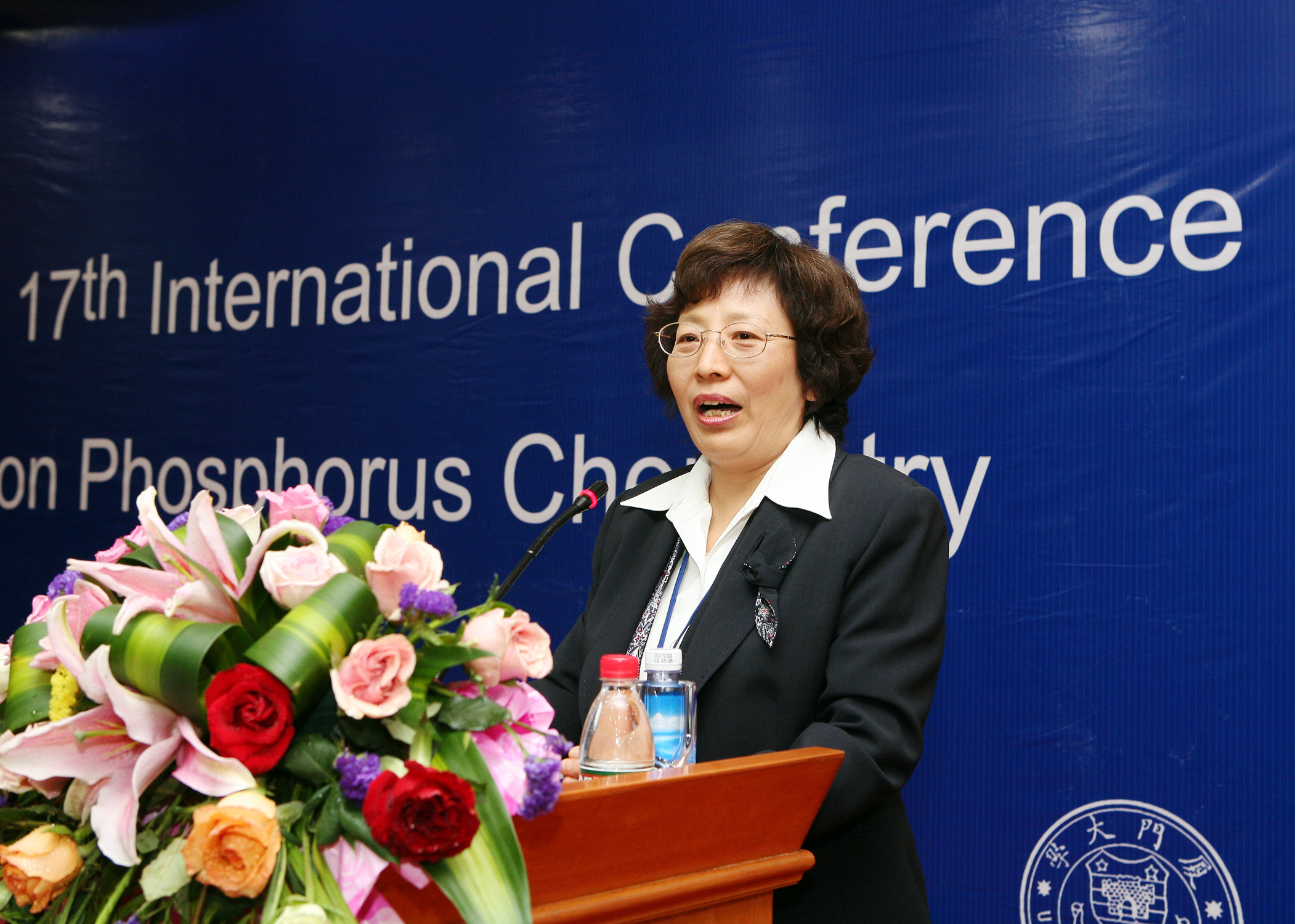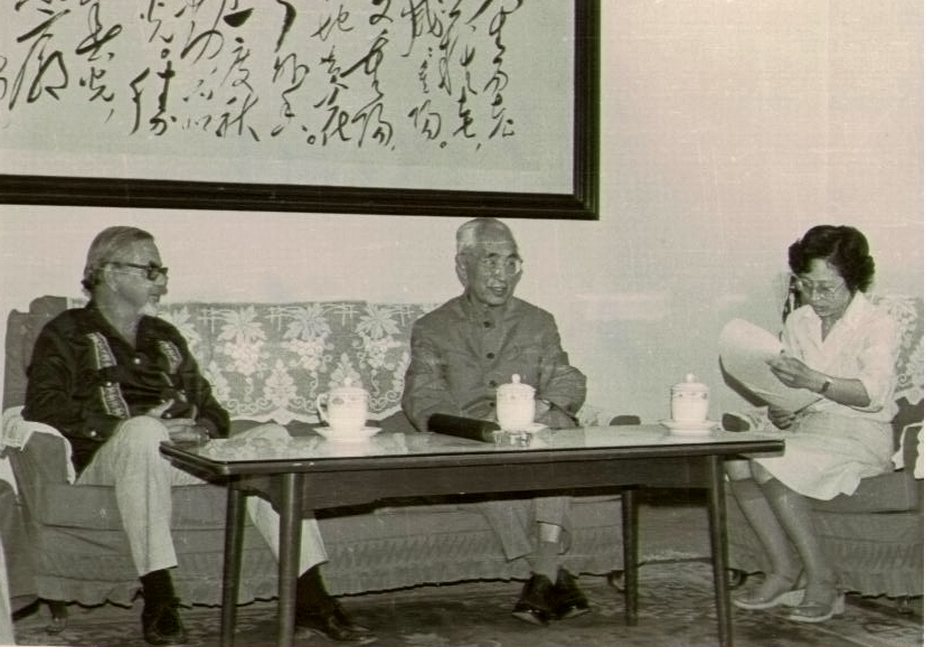She, who grew up in Taiwan and studied in the United States, was one of the first Taiwanese scholars to return to the Chinese mainland; she found that phosphoryl amino acids were related to the origin of life, calming the debate about whether the chicken or the egg came first; she was the youngest female academician of the Chinese Academy of Sciences at that time and won the Arbuzovs Award, the highest prize in the world's phosphorus chemistry.

She has kept moving, from Taipei to New York to mainland China, in order to pursue the way home; she has been searching for 40 years in the chemistry discipline, in order to seek the origin of life.
She often smiled and said: "As long as you are interested and persistent, there is no difficulty." She is, Zhao Yufen.
In 1948, Zhao was born in Hankou, Hubei Province. She was brought to Changhua County, Taiwan by her parents when she was less than a year old. The family lived a hard life, with six children in total huddling in two small rooms in an ancestral hall. In her childhood, Zhao often ran for more than 20 minutes to go to school barefoot in order to save money on shoes. In addition to school work, she had to help with laundry, cooking, and caring for her younger siblings.
When Zhao was in her teens, her father died unfortunately and the family became even poorer. Friends and relatives advised Zhao's mother to send the children to the church to ease the family burden, but the mother refused. She worked everywhere to make money and tried her best to support her six children. Zhao's mother often said to her: "In the future, you must choose a useful major, which can directly create wealth." Through words and deeds, Zhao learned self-improvement early.
Zhao, She met the chemistry teacher Kong Xiangzhen who studied in the National Changhua Girls' Senior High School in Taiwan. "The teacher explained the physicochemical knowledge so vividly that we were not bored in class, and the experiment seemed very magical. I have been interested in chemistry since high school." Therefore, when applying for university, Zhao chose the chemistry major at the National Tsinghua University, Hsinchu.
In 1971, 23-year-old Zhao completed her university studies and received the admission offer of the State University of New York at Stony Brook with excellent results. She also received generous scholarships, however, the $300 air ticket to the United States was a problem for a poor family like Zhao's.
Perhaps it is the experience of the hard life in childhood, and her mother's tenacity that taught her that no problem cannot be solved. Zhao finally used the scholarship certificate as a proof to get the ticket for the US and repaid to the airline $30 per month.
Upon her arrival in the United States, Chinese American Professor Yang Zhenning was just delivering a speech about mainland China at the State University of New York at Stony Brook. "The spring of Chinese science is coming. China needs a large number of scientific research talents." This was the first time Zhao had heard the news of the mainland of China.
In the second year, a Chinese delegation of scientists visited the United States. As a representative of Taiwanese students, Zhao presented flowers to Prof. Bei Shizhan, the leader of the delegation and pioneer scholar in Chinese life sciences. The first close contact with mainland compatriots made the strange place of "the motherland" no longer far away for Zhao.

Qi County, Henan Province was the birthplace of the ancient Central Plains culture and the capital of the Shang Dynasty with a splendid bronze civilization. It is also the ancestral home of Zhao. In 1978, Zhao heard about the address of her hometown in Qi County from a relative in the United States. She contacted many times and finally received a reply. In the summer of that year, Zhao immediately embarked on the "hometown trip". "I want to go back to my hometown. I am going to find my roots. I am going to fulfill my parents' wishes for more than 20 years.”
Walking along the Qi River, which her mother often talked about in her childhood, Zhao saw the clear water and the dense poplar forest on the shore. During the one month in the mainland, Zhao visited her grandfather who was in his 90s and watched him writing with a Chinese brush: "It is good to serve the people, and the granddaughter is now returning home." She went to Yin Ruins in Henan Province and felt intuitively a connection with the enduring appeal of Chinese culture for five thousand years. She also investigated several universities such as Peking University and Nankai University, as well as the Institute of Chemistry, Chinese Academy of Sciences and noticed that major equipment was available for experiments which she used in the United States. She also arrived at the commercial center Wangfujing and was shocked by the old and shabby shops and extremely scarce goods there.
"Going home, going home, going home!" When completing her postdoctoral research, Zhao, a rising figure in the research on bioorganic phosphorus chemistry, decided to return to the mainland and contribute her share to her compatriots! R. Shapiro, her mentor and world-renowned nucleic acid chemist, said: "Your decision is brave, but it is a Chinese gain, American loss."
"Henan is the root of my life, while Taiwan is where my life sprouted. The United States is the place for my enlightenment, and China is where my career grows into a big tree. These places are like living seeds and different stages are like epitomes of my life course." Zhao said.
Zhao, after returning to China, chose phosphorus to continue with her research. By chance, she linked phosphorus to amino acids and discovered an anomaly that has never been documented in the literature: a chemically stable amino acid would become very active once combined with phosphorus to form a phosphoryl amino acid. It can grow up in the water, produce dipeptides (protein precursors), and can also form nucleotides with nucleosides.
Proteins and nucleic acids are existing forms of life, in which proteins are molecules that perform functions and nucleic acids are genetic information molecules. As the debate about whether there is a chicken or an egg first, there is a successive dispute over the origin of life. Is there protein or nucleic acid first? This is the long-standing "chicken-or-egg" dispute in the scientific community.
Zhao's mentor, Prof. Ramirez, once told her, "When a chemical reaction does not produce a predicted result, it may not be a failure; please pay attention to what it actually is. This unexpected result is likely to be an innovation.”
Zhao noticed this anomaly and conducted 20 kinds of amino acid and phosphorus synthesis experiments with her students within ten years. Based on this, she first solved the mystery of life from the perspective of phosphorus chemistry, and proposed that phosphoryl amino acid is the smallest system of life evolution. This amazing discovery has quelled the "chicken-or-egg" debate and proven that chickens and eggs were produced at the same time.
In 1990, at the 11th International Conference on the Origin of Life held in Orleans, France, based on a large number of experimental results and logical theoretical arguments, Zhao proposed that "Phosphoryl amino acids are the common origin of nucleic acids and proteins, and are the seeds of the origin of life", which was refreshing for the nearly 400 scientists including some Nobel Prize winners. Authoritative scientists, such as the member of Executive Committee of International Life Sciences Institute, Antonio Lazcano, believe that were exciting important results valuable for life science research. In 1991, 43-year-old Zhao became the youngest female academician of the Chinese Academy of Sciences in China. In 1993, she won the first "China Outstanding Young Chemist Award". Two years later, in 1995, she was elected as a foreign academician of the Russian Academy of Sciences.
In November 2000, Zhao came to Xiamen to attend the National Conference on Organic Chemistry. "When I set foot on the land of Xiamen, I felt a deep affection. The local accent, customs and living habits were so similar to that in my childhood memories. I felt like have returned to my hometown. In particular, there was also a well-known institution of higher learning, Xiamen University, which has a College of Chemistry and Chemical Engineering with considerable influence in chemistry discipline nationwide, strong scientific research strengths and team spirit. It was very attractive to me." Soon, Zhao joined XMU.
At XMU, Zhao, leading a team of more than 20 people, successfully completed the pilot experiment of biopharmaceutical alanyl-glutamine synthesis after three years of hard work, and applied for Chinese and international patents, which has now been fully put into production. Zhao also proposed to build a "Strait Chemical Biotechnology Belt" in Xiamen City, in order to to enhance exchanges and cooperation on life science, oceans, medicines and other biotechnology resources between both sides of the strait, to promote the common development of the southeast coastal economy and cross-strait economy, and then to radiate the effects to Southeast Asia... Currently, Zhao and her research team carry out experiments by diving 6.7 kilometers below the ocean surface, on International Space Station, and even plan to go to Mars. Their research on the origin of life is getting more in-depth.
Zhao said: "We are studying life from scratch. This span is very large. The life of the earth today is 4.5 billion years. Studying the origin of life cannot be done by a student, but by several generations of students. This generation of students studied a bit, we took a step forward, the next generation of students went on to study, and then we went further... It was 40 years since 1979 when our students, not only masters, but also more than 100 doctoral students, participated in the research. Some problems are solved by an individual, some can only be passed down from generation to generation, but as long as the interest is maintained, human beings can progress, and we scientists must have this spirit." Human beings have an eternal curiosity about where they come from, and it is this curiosity that inspires humanity to move forward.

